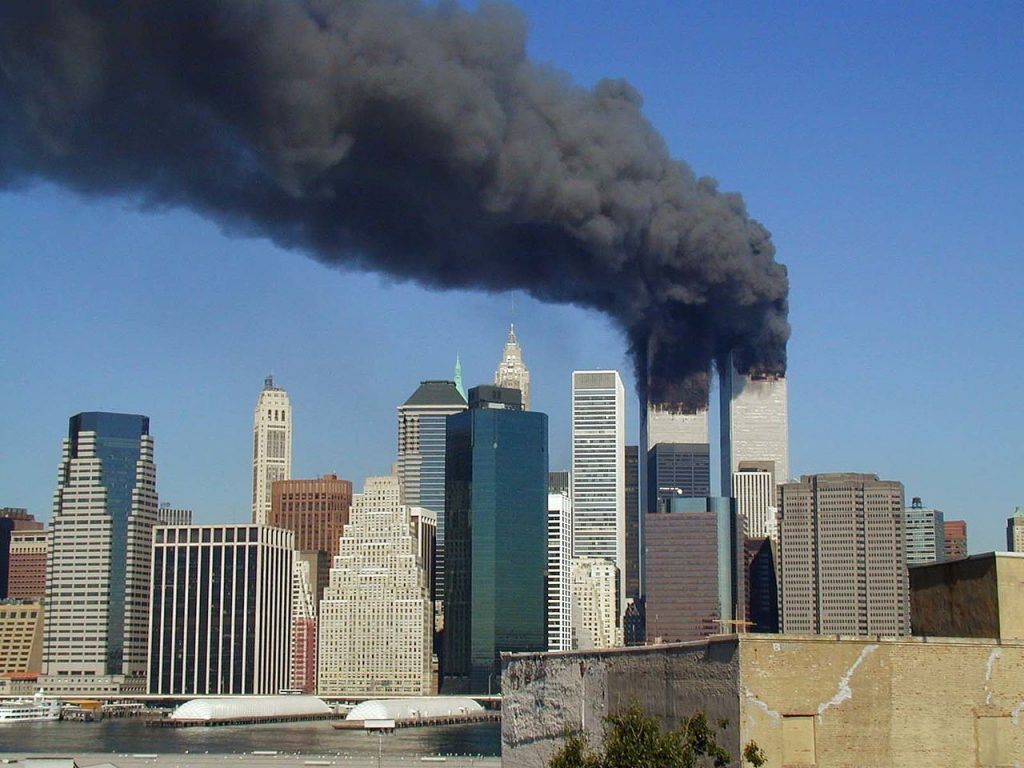
The attacks on the World Trade Center as well as the Pentagon in September 2001, dubbed 9/11, were a major news event. As is the case with traumatic events, people often remember exactly what they were doing when they heard the news. With 9/11, however, visual images have been engraved in people’s minds as well: a plane flying into the towers and people subsequently – out of sheer desperation – jumping out of windows. Michael Moore’s documentary, Fahrenheit 9/11, offers an alternative media perspective signifying 9/11: that of a president overwhelmed by the news and incapable of an immediate reaction.
On September 11, 2011, then President of the United States, George W. Bush, was scheduled to visit Emma E. Booker Elementary School in Sarasota, Florida. He was accompanied by a cohort of journalists who covered the students’ reading of “My Pet Goat” on television. When White House Chief of Staff, Andrew Card, whispered into Bush’s ear, “A second plane has hit the second tower. America is under attack,” Bush remained in his seat for another seven minutes, seemingly incapable of dealing with the situation. Yet Andrew Card had carefully chosen his words and immediately stepped back to avoid further questioning from the President in front of the children. So why didn’t George W. Bush jump up immediately, leave the classroom, and take charge of the situation? Andrew Card claims that the President dealt extremely well with the news, remaining calm and collected. In the meantime, his team was busy gathering information to assess the situation. The school visit had been scheduled for weeks and was, in fact, public knowledge. Were the President and maybe even the school targets?
Certainly, the first objective was to ensure the President’s safety. Although the media criticized him for being AWOL (Absent Without Official Leave) in the eight hours following the attacks, it was Moore’s documentary that scrutinized this particular moment. Instead of allowing him to reassure fellow Americans that everything was under control, Bush was escorted to the safest place his security team could think of: Air Force One. Did Bush fail in his role as President and Commander-in-Chief, or was he in fact deliberately calm and collected?
Garrett M. Graaf’s article that appeared nearly fifteen years after the attack is based on forty hours of original interviews. “We’re the Only Plane in the Sky” portrays the experiences of passengers, members of the administration, crew, and the White House press aboard the aircraft. Two factors influenced Bush’s decisions that day:
- Without smart phones, communication wasn’t nearly as good as it is today. News was coming in slowly and, due to the attack on the Pentagon, sheer chaos had broken out in Washington, D.C. Since airplane pilots all over the U.S. used the same systems to get in touch with their operators after the Federal Aviation Administration (FAA) imposed a no-fly zone, communication systems were saturated. Planes that were already airborne had to prove that they were not hijacked. Whenever communication did work, the President was swamped with news – most of the information was neither vital nor confirmed.
- The President is not nearly as autonomous as many believe. George W. Bush immediately wanted to return to Washington, D.C., but Secret Service agents literally prevented him from doing exactly that. By federal law, the Secret Service has to protect the President even against his own wishes. Dave Wilkinson, the Assistant Agent-in-Charge, claims that despite Bush fighting them “tooth and nail all day,” Wilkinson did understand that there were too many passengers aboard whose lives were at risk.
Air Force One made two stops that day before returning to D.C.: one at Barksdale Air Force Base, where the President made another brief statement, and the second at Offutt Air Force Base, where he held a video conference with Vice President Dick Cheney. The President finally demanded to return to the White House. One member of staff remarked, “You would have had to tie him down to keep him there [in Offutt] overnight.” Mike Morell of the Central Intelligence Agency remembers an insecure Bush transforming into a “wartime president in just a matter of hours.”
While Bush’s subsequent actions underlined his new-found role of a strong leader, his “Global War on Terrorism” has been criticized ever since. Nevertheless, the memorable moment at Emma E. Booker Elementary School reflected a deliberating, controlled President and not the helplessly incapable person Michael Moore portrays.
21,469 Total Views, 2 Views Today






